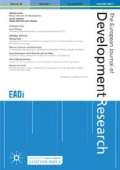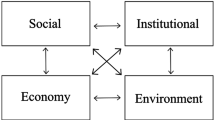Abstract
It is a core principle in non-governmental organisation (NGO)-driven development that interventions must be ‘sustainable’. Individuals and communities are to be ‘empowered’ to take responsibility for their own development in ways that will eventually make donor funding redundant. On the basis of ethnographic fieldwork with NGOs supporting ‘orphans and vulnerable children’ in Malawi, this article explores the practices, social relations and contradictory effects that the vision of sustainability engenders. The article illustrates how the commitment to sustainability paradoxically produces practices that can only be sustained through continuous flows of donor funding. It argues that the persistence of sustainability as an organising principle is connected both to its self-confirming logic and to the ways in which practices of ‘sustainability’ shape the subjectivities of local brokers and come to constitute a central avenue for pursuing personal projects of development.
Abstract
Un des principes-clés du développement dicté par les ONG c’est que leurs interventions doivent être ‘durables’. Les individus et les communautés doivent être ‘habilités’ à se responsabiliser pour leur développement, afin qu’en futur le financement des donateurs ne soit plus nécessaire. Cet article est basé sur le travail sur le terrain d’une étude ethnographique avec des ONGs soutenant des ‘orphelins et enfants vulnérables’ au Malawi. On explore les pratiques, les relations sociales, et les effets contradictoires engendrés par la notion de durabilité. On illustre comment l’engagement envers la durabilité produit, paradoxalement, des pratiques qui ne sont durables qu’avec un financement soutenu de la part des donateurs. La persistance de la durabilité comme principe organisateur est lie soit à sa logique autonome, soit à la façon dans laquelle les pratiques durables modèlent les subjectivités de courtiers locaux, et constituent un des moyens principaux de développement individuel.
Similar content being viewed by others
Notes
All names of organisations and persons appearing in this article are pseudonyms.
This interview was conducted in Chichewa by my research assistant and was subsequently translated into English.
It also makes sense according to local cultural norms. The ‘ethics of interdependence’ that Scherz (2014) defines as central to Kiganda culture resonates with my fieldwork experiences in Central Malawi; people with resources are morally obliged to share those with clients.
References
Abebe, T. and Aase, A. (2007) Children, AIDS and the politics of orphan care in Ethiopia: The extended family revisited. Social Science & Medicine 64(10): 2058–2069.
Beard, B.J. (2006) Prioritized needs of community based orphan care programs in Malawi. International Journal of Child & Family Welfare 9(3): 145–159.
Bierschenk, T. et al. (2002) Local Development Brokers in Africa. Mainz: IFAS Working Papers no. 13.
Booth, D. et al. (2006) Drivers of Change in Malawi. Overseas Development Institute. Working Paper, London, UK.
Chambers, R. (1983) Rural Development: Putting the Last First. Harlow, UK: Longman.
Cooke, B. and Kothari, U. (eds.) (2001) Participation – The New Tyranny? London: Zed Books.
Cornwall, A. and Brock, K. (2005) What do buzzwords do for development policy? A critical look at ‘participation’, ‘empowerment’ and ‘poverty reduction’. Third World Quarterly 26(7): 1043–1060.
Dean, M. (2004) Governmentality: Power and Rule in Modern Society. London: Sage Publications.
Devereux, S. and McGregor, J.A. (2014) Transforming social protection: Human wellbeing and social justice. European Journal of Development Research 26(3): 296–310.
Englund, H. (2006) Prisoners of Freedom: Human Rights and the African Poor. Cambridge, UK: Cambridge University Press.
Ferguson, J. (1994) The Anti-Politics Machine: ‘Development, Depoliticization, and Bureaucratic Power in Lesotho. Minneapolis, MN; London: University of Minnesota Press.
Ferguson, J. (2010) The uses of neoliberalism. Antipode 41(s1): 166–184.
Ferguson, J. and Gupta, A. (2002) Spatializing states: Toward an ethnography of neoliberal governmentality. American Ethnologist 29(4): 981–1002.
Foucault, M. (2002) The subject and power. In: J.D. Faubion (ed.) Michel Foucault: Power. Essential Works of Foucault 1954–1984 – Volume 3. London: Penguin Books.
Gabay, C. (2014) Two ‘transitions’: The political economy of Joyce Banda’s rise to power and the related role of civil society organisations in Malawi. Review of African Political Economy 41(141): 374–388.
Gaynor, N. (2010) Between citizenship and clientship: The politics of participatory governance in Malawi. Journal of Southern African Studies 36(4): 801–816.
Green, M. (2013) Calculating compassion: Accounting for some categorical practices in international development. In: D. Mosse (ed.) Adventures in Aidland: The Anthropology of Professionals in International Development. New York, Oxford: Berghahn Books, pp. 33–56.
Green, M. (2014) The Development State: Aid, Culture & Civil Society in Tanzania. Suffolk, UK: James Currey.
Gronemeyer, M. (2010) Helping. In: W. Sachs (ed.) The Development Dictionary: A Guide to Knowledge as Power 2nd edn. London: Zed Books.
Harsh, M. et al. (2010) Accountability and inaction: NGOs and resource lodging in development. Development and Change 41(2): 253–278.
James, R. and Malunga, C. (2006) The Rise and Pitfalls of Civil Society Networks in Malawi. Oxford: International NGO Training and Research Centre.
Kelsall, T. and Mercer, C. (2003) Empowering people? World vision & ‘transformatory development’in Tanzania. Review of African Political Economy 30(96): 293–304.
Knutsson, B. (2014) Smooth machinery: Global governmentality and civil society HIV/AIDS work in Rwanda. Globalizations 11(6): 793–807.
Krause, M. (2014) The Good Project: Humanitarian Relief NGOs and the Fragmentation of Reason. Chicago, IL: The University of Chicago Press.
Li, T.M. (2007) The Will to Improve: Governmentality, Development, and the Practice of Politics. Durham, NC: Duke University Press.
Li, T.M. (2013) Rendering society technical: Government through community and the ethnographic turn at the world bank in Indonesia. In: D. Mosse (ed.) Adventures in Aidland: The Anthropology of Professionals in International Development. New York, Oxford: Berghahn, pp. 55–79.
Mansuri, G. and Rao, V. (2004) Community-based and-driven development: A critical review. The World Bank Research Observer 19(1): 1–39.
Marsland, R. (2006) Community participation the Tanzanian way: Conceptual contiguity or power struggle? Oxford Development Studies 34(1): 65–79.
Miller, P. and Rose, N. (2008) Governing the Present: Administering Economic, Social and Personal Life. Cambridge, UK: Polity.
Ministry of Gender, Child Welfare and Community Services and UNICEF (2003) National Policy on Orphans and Other Vulnerable Children Mainz.
Mohan, G. and Stokke, K. (2000) Participatory development and empowerment: The dangers of localism. Third World Quarterly 21(2): 247–268.
Morfit, N.S. (2011) ‘AIDS is money’: How donor preferences reconfigure local realities. World Development 39(1): 64–76.
Mosse, D. (2004) Is good policy unimplementable? Reflections on the ethnography of aid policy and practice. Development and Change 35(4): 639–671.
Mosse, D. and Lewis, D. (eds.) (2006) Theoretical approaches to brokage and translation in development. In: Devevelopment Brokers and Translators: The Ethnography of Aid and Agencies. Bloomfield, CT: Kumarian Press, pp. 1–26.
Olwig, M.F. (2013) Beyond translation: Reconceptualizing the role of local practitioners and the development ‘interface’. European Journal of Development Research 25: 428–444.
Rigon, A. (2014) Building local governance: Participation and elite capture in slum-upgrading in Kenya. Development and Change 45(2): 257–286.
Rose, N. and Miller, P. (1992) Political power beyond the state: Problematics of government. British Journal of Sociology 43(2): 173–205.
Scherz, C. (2014) Having People, Having Heart: Charity, Sustainable Development, and Problems of Dependence in Central Uganda. Chicago, IL: The University of Chicago Press.
Swidler, A. (2006) Syncretism and subversion in AIDS governance: How locals cope with global demands. International Affairs 82(2): 269–284.
Swidler, A. and Watkins, S.C. (2009) ‘Teach a man to fish’: The sustainability doctrine and its social consequences. World Development 37(7): 1182–1196.
Watkins, S.C. and Swidler, A. (2013) Working misunderstandings: Donors, brokers, and villagers in Africa’s AIDS industry. Population and Development Review 38: 197–218.
Acknowledgements
Funding for this research was provided by the Danish Research Council for the Social Sciences. A previous version of this article was presented at the fifth European Conference on African Studies in Lisbon 27–29 June 2013, in a panel entitled ‘Governing AIDS through aid to civil society: power, responsibilization and resistance’. The author is grateful to the organisers and participants in this panel for helpful questions and comments. She also thanks her colleagues in the International Development Studies Research Group at Roskilde University for fruitful feedback on her article. Additionally, the author acknowledges the support of Susan Cotts Watkins, Uma Kothari, Lisa Ann Richey and Mette Fog Olwig – who have all read, commented or engaged with this article at various stages. Finally, the author is immensely grateful for the research assistance provided in Malawi by Ipyana and Augustine Mwalwimba, Macdonald Njoloma and McPherson Chatama.
Author information
Authors and Affiliations
Corresponding author
Rights and permissions
About this article
Cite this article
Rasmussen, L. In the Name of Sustainability: Contradictory Effects of NGO-Driven Development in Malawi. Eur J Dev Res 29, 312–327 (2017). https://doi.org/10.1057/ejdr.2016.8
Published:
Issue Date:
DOI: https://doi.org/10.1057/ejdr.2016.8




